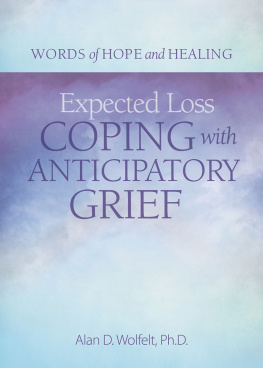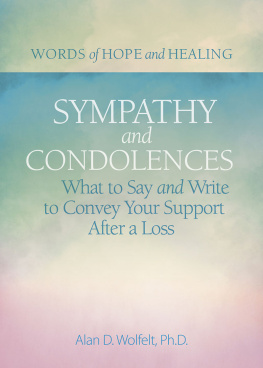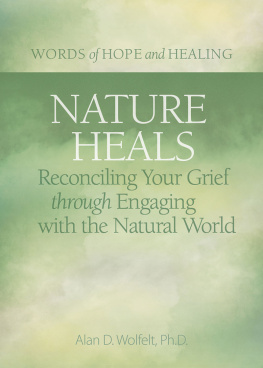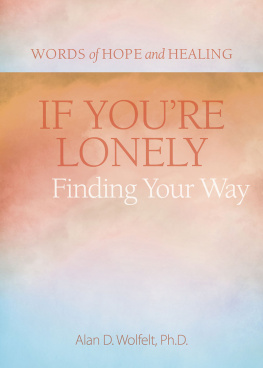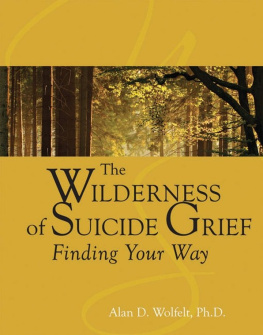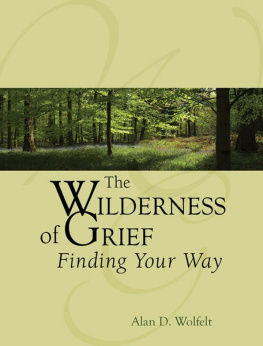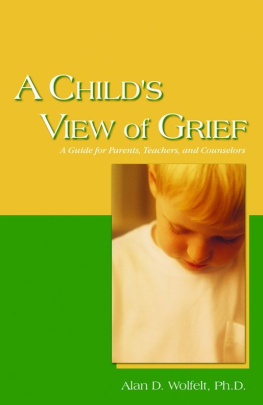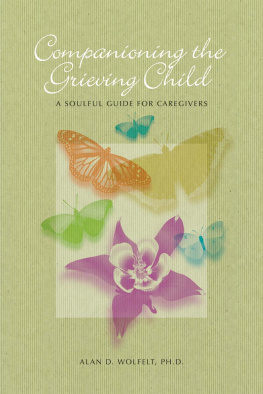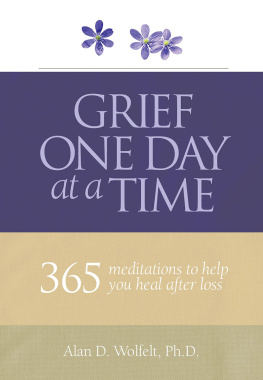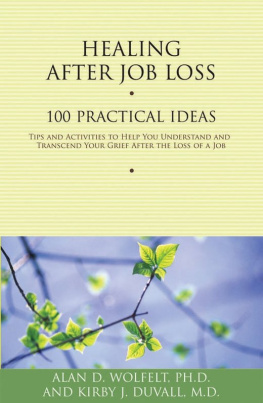Alan Wolfelt - Expected Loss
Here you can read online Alan Wolfelt - Expected Loss full text of the book (entire story) in english for free. Download pdf and epub, get meaning, cover and reviews about this ebook. year: 2020, publisher: Companion Press, genre: Religion. Description of the work, (preface) as well as reviews are available. Best literature library LitArk.com created for fans of good reading and offers a wide selection of genres:
Romance novel
Science fiction
Adventure
Detective
Science
History
Home and family
Prose
Art
Politics
Computer
Non-fiction
Religion
Business
Children
Humor
Choose a favorite category and find really read worthwhile books. Enjoy immersion in the world of imagination, feel the emotions of the characters or learn something new for yourself, make an fascinating discovery.
- Book:Expected Loss
- Author:
- Publisher:Companion Press
- Genre:
- Year:2020
- Rating:3 / 5
- Favourites:Add to favourites
- Your mark:
- 60
- 1
- 2
- 3
- 4
- 5
Expected Loss: summary, description and annotation
We offer to read an annotation, description, summary or preface (depends on what the author of the book "Expected Loss" wrote himself). If you haven't found the necessary information about the book — write in the comments, we will try to find it.
Expected Loss — read online for free the complete book (whole text) full work
Below is the text of the book, divided by pages. System saving the place of the last page read, allows you to conveniently read the book "Expected Loss" online for free, without having to search again every time where you left off. Put a bookmark, and you can go to the page where you finished reading at any time.
Font size:
Interval:
Bookmark:
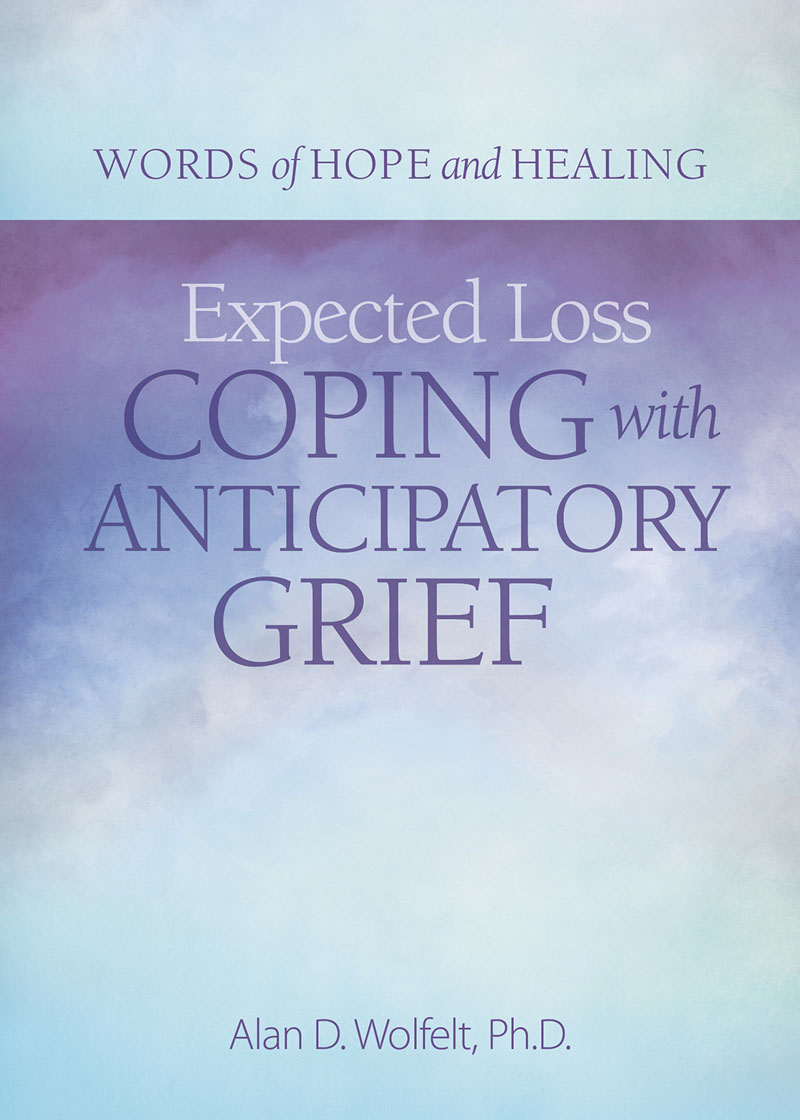
2020 by Alan D. Wolfelt, Ph.D.
All rights reserved. No part of this publication may be reproduced, stored in a retrieval system, or transmitted in any form or by any means, electronic, mechanical, photocopying, recording, or otherwise, without the prior permission of the publisher.
Companion Press is an imprint of the Center for Loss and Life Transition, 3735 Broken Bow Road, Fort Collins, Colorado 80526.
25 24 23 22 21 20 6 5 4 3 2 1
ISBN: 978-1-61722-295-5
The art of life lies in a constant readjustment to our surroundings.
Kakuzo Okakura
If you are living through a time of difficult change leading to an expected loss, this book is for you.
Change is hard. Loss is hard. You need and deserve compassion and support. Thank you for allowing me the privilege of having this conversation with you during this difficult period in your life. I hope it will help you better understand and express your normal, necessary grief.
All great changes are preceded by chaos.
Deepak Chopra
Before we focus on anticipatory grief, perhaps we should begin by defining grief itself. So, what is grief, anyway?
Grief is everything you think and feel inside of you after a loss of any kind. We all understand that the death of someone loved causes grief, of course, but so do other kinds of significant losses and life transitions. Divorce, job loss, relocation, estrangement or separation from friends and family, health issues, and many other common life experiences often give rise to profound grief.
Typical grief feelings include (but arent limited to) numbness, shock, denial, confusion, disorientation, anger, guilt, relief, yearning, and sadness. Grieving people typically experience several feelings at the same time, and their emotions often change from day to day or even moment to moment.
In general, the stronger your attachment to a person, situation, or thing, the stronger your grief will be when your ties to that person, situation, or thing are severed or placed in jeopardy.
Grief is a normal and necessary part of life because change and loss are normal and unavoidable parts of life. Whats more, grief is a corollary to love. In fact, grief is love in the face of separation or change. To live and to love as a human being is to one day grieve.
If grief is the inner experience of loss, anticipatory grief is the inner experience of expected loss. If you love someone who is dying, for example, you will naturally begin to anticipate their eventual death. You will likely feel many of the emotions listed above as you witness their journey and the changes they are undergoing as well as consider the many what ifs and what nextsincluding imagining your life after the death.
Anticipatory grief often has two components: process and projection.
The first has to do with the process of living through change. Many big life changes and losses are not instantaneous but rather play out over the course of months or even years.
For instance, if you are caring for someone with dementia, you will begin to see that person changing in both subtle and substantial ways before your very eyes. These changes are gradual, and they may even seem to reverse at times. As the person slowly changes, your relationship with them changes, too. These changes cause grief because characteristics you were attached to are fading away and being replaced by characteristics that are new, strange, or difficult. Its as if the person you have loved is leaving you even though they are physically still there.
Other common life changes that are often drawn out over time and cause anticipatory grief include separation and divorce, the maturation and eventual independence of children, health declines due to chronic illness and/or aging, and financial downturns.
The other component of anticipatory grief has to do with the natural human tendency to project ourselves forward in time. Among animals, what best distinguishes our species is our capacity to think about the future. Our minds are powerful tools. They allow us to do many complicated tasks, including visualizing and planning for whats to come. This amazing ability is what enables us to do things like attend and complete educational courses, make family plans, and save for and imagine distant goals, like retirement. However, it can also cause us to worry, catastrophize, and spend more time and energy in our imaginations than in the present.
Its normal to think about, and yes, worry about what will happen after the loss you are anticipating is over. Depending on the loss you are expecting, this finality might mean death, divorce, relocation, bankruptcy, etc. Whats more, this projection part of your anticipatory grief may include some buoyant feelings, like hope and release. Especially if you are experiencing a painful or turbulent time of change right now, you may be looking forward to some aspects of your life stabilizing or improving after the loss. This is also understandable and normal.
And finally, keep in mind that anticipatory grief often crops up during times of normal, happy life transition. If you have a child about to graduate from high school and head off to college, for example, you may experience anticipatory grief in the months leading up to the move. The same thing can happen before a wedding, the birth of a baby, or a hoped-for career change. The common denominator is that change is hard, and we almost always grieve aspects of significant change, even when the change is something were looking forward to.
I will also note that theres another category of loss experience that may overlap with anticipatory grief. Its called ambiguous loss. Ambiguous loss is when you find yourself grieving in loss circumstances that dont have a clear endpoint or status. For example, if a loved one struggles with long-term addiction and is in and out of sobriety, you may be living with anticipatory griefgrieving the process and projecting possible death or ruinyet there may never be a climactic resolution of any kind. If you feel your anticipatory grief circumstances are also ambiguous, I see you, and I welcome you to this conversation.
Common situations that cause anticipatory grief include:
- Terminal or life-threatening illness (of someone else or of oneself )
- Dementia
- Aging
- Divorce
- Pending major medical procedures (such as mastectomy or open-heart surgery)
- Upcoming major life transitions (such as graduation, weddings, job change, or pending relocation or geographical separation)
If we think of regular grief as what we feel inside after a significant change is final, and we think of anticipatory grief as what we feel inside during the process of the change, we find that theyre very similar but have a few differentiating features.
First, because anticipatory grief typically begins during a period of change, it can be more chaotic and unpredictable. Whats changing hasnt yet settled into its final state. You may not even know what the final outcome will be. You may be imagining a number of different possible scenarios. You might not know what to wish for. Human beings generally dont like to live in this kind of uncertainty. Its uncomfortable and disorienting.
Second, you will likely experience heightened emotions as the person or thing you are attached to undergoes this change. You might feel ferociously protective or surprisingly torn or ambivalent. You may simply wish for it to be over.
Next pageFont size:
Interval:
Bookmark:
Similar books «Expected Loss»
Look at similar books to Expected Loss. We have selected literature similar in name and meaning in the hope of providing readers with more options to find new, interesting, not yet read works.
Discussion, reviews of the book Expected Loss and just readers' own opinions. Leave your comments, write what you think about the work, its meaning or the main characters. Specify what exactly you liked and what you didn't like, and why you think so.

